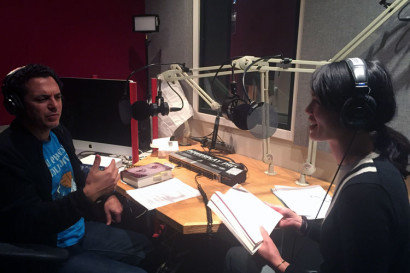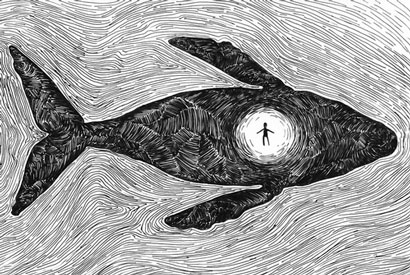From the Bible to Yoko Ono: Chapter & Verse podcast spans universe of culture
Scott Saul, English professor and Richard Pryor biographer, conducts in-depth conversations with artists for Townsend Center's new online show.
February 4, 2016
Scott Saul sees his new Chapter & Verse podcast, in which he interviews scholars and writers who are either based at the University of California, Berkeley, or coming through the Bay Area, as a way of bringing the wide world of culture — novels, nonfiction, music, poetry, film and more — to curious listeners wherever they may be.
Saul, a professor of English and author of the 2014 book, Becoming Richard Pryor, launched the podcast in late December through the sponsorship of Berkeley’s Doreen B. Townsend Center for the Humanities as an element of the center’s commitment to public humanities. Listeners can tune in via the Chapter & Verse website, or through iTunes.
The inaugural episode features a discussion with Julia Bryan Wilson, a Berkeley art historian and noted art critic, about the widely misunderstood, cutting-edge artist Yoko Ono. The 45-minute conversation traces Ono’s emergence from the avant-garde worlds of the early 1960s and development into a pioneer of conceptual and performance art. It explores how her art took on new ambitions when she began collaborating with her late husband, John Lennon. And it delves into how Ono — with her 5 million Twitter followers— has harnessed the power of social media like no other artist of her generation.
The idea of the podcast, Saul said, is to “break down the stories we tell in order to live, to cop a phrase from Joan Didion. In the case of a work of art, that means examining it from a multitude of angles and hearing it reverberate on all its different registers.”

English professor Scott Saul and Katrina Dodson discuss Dodson’s recent translation of Clarice Lispector’s Complete Stories (2015), which collects all 85 short stories by one of Brazil’s most important writers, from Lispector’s first published story in 1939 at the age of 19 to her last, written in 1977.
Saul called the program a conversation, and described his guests as scholars, historians, journalists, artists, critics and more: “We are going deeper, but still scratching the surface of what these people (being interviewed) know.”
He’s excited about the podcast, which he described as an “idealized version of what happens at a seminar table in the humanities: It conveys the give-and-take of intellectual exchange and the light and heat generated when knowledgeable thinkers delve into a work of art.”
One report on Mashable called 2015 “a breakout year for podcasts.” Saul notes that more and more people seem drawn to podcasts centered on literature and the arts, such as ones hosted by the New Yorker and the Los Angeles Review of Books.
Expanding what humanities professors do
Townsend Center Director Alan Tansman said he hopes the podcast will “help gain a broad audience for the rich interviews Scott Saul has put together because we believe he’s the perfect person, as a writer of great talent who himself has reached a broad and diverse audience, to bring the work of our intellectual community to a broader audience. The podcasts represent an important effort to install the humanities in the larger body politic.”
Saul suggests that it is important for more professors to engage with a larger public. “More of us in departments like English and history are taking up the challenge of reaching a broader audience and shaping public debate, whether through podcasts or journalism or social media, and I think that’s a great thing.”
Alter on the Bible at its most unorthodox

Scott Saul and Robert Alter take a fresh look at an old story, The Book of Jonah.
In addition to the Ono podcast, Saul and his co-producer, Gina Pollack, a master’s student at Berkeley’s Graduate School of Journalism, have just posted a new episode with Robert Alter, a Berkeley professor emeritus of Hebrew and comparative literature who is an internationally renowned scholar and translator of the Bible.
They dive deeply into the “the Bible at its most unorthodox”: the two books of the Hebrew Bible that never mention the word God (the Book of Esther and the Song of Songs), and the book of the Bible that most intently focuses beyond the nation of Israel, the Book of Jonah.
“In the Book of Esther, the closest the Bible comes to a sex comedy,” said Saul on the Chapter & Verse website, “a beautiful Jewish commoner joins a Persian king’s harem and contrives to save her people. In the Song of Songs, two lovers engage in a dance of mutual seduction that encourages us, as readers, to ‘be drunk with loving.’ And in the Book of Jonah, a man who refuses to preach to his enemies is swallowed by a giant fish – God working in magical as well as mysterious ways.”
Alter said the podcast conversation differed from his usual media encounters.
“In a typical interview with a reporter, you tend to feel that your work is more or less unknown territory, so that you are often in the position of explaining basics, almost like translating a foreign language,” he said. “Because Scott is an intelligent literary scholar and a student of cultural studies, this was never the case. I felt from the outset that he had a lucid understanding of what I was trying to do in my translation and commentary, and as a result the interview was less like an interview than like a productive and agreeable conversation between colleagues.”
How might listeners experience this?
“I’m not sure I know,” said Alter. “But I’d say the audience is likely to find the conversation more engaging than a conventional interview.”
Award-winning Namwali Serpell
An interview in the lineup in the coming weeks includes one with Berkeley associate professor of English Namwali Serpell, the Zambian author who last year won the Caine Prize for African Literature for her short story, “The Sack.” She generated headlines when she shared her $15,400 prize money with four other writers who had been shortlisted for the award. Serpell shares what it means to her to be both a fiction writer and a literary critic, and discusses how she tried, in “The Sack,” to open up what an “African short story” could be.
Treasure Island

A Chapter & Verse conversation assesses what makes Treasure Island such an enduring hit.
Ian Duncan, another Berkeley professor of English and an expert in Romantic, Victorian and Scottish literature who has written extensively on Robert Louis Stevenson, is another scheduled guest. He sits down with Saul to discuss in detail Stevenson’s classic, Treasure Island.
Saul described Stevenson as “that rare bird among writers: an author who has pulled in the affections of both young readers — sometimes very young readers — and the most discriminating of his fellow writers, from Henry James and Joseph Conrad to Italo Calvino and Vladimir Nabokov. His writing, we might say, has both the common and the uncommon touch.”
Spring listings

The cover of Katrina Dodson’s translation of Brazilian writer Clarice Lispector’s Complete Stories, which was just shortlisted for PEN’s Translation Prize.
Saul and Pollack are back in their audio studio this semester, and they plan to expand the ambit of the podcast with episodes that take on the culture of politics and science as well as literature and the arts.
They will be recording a show with Zachary Shore, a historian with Berkeley’s Institute of European Studies, around his book A Sense of the Enemy: The High Stakes History of Reading Your Rival’s Mind; a show with journalist and Berkeley lecturer Kara Platoni about her new book on the “hacking” of the senses, We Have the Technology: How Biohackers, Foodies, Physicians and Scientists Are Transforming Human Perception; a show with the TV critic and essayist Lili Loofbourow, an alum of Berkeley’s English graduate program, about the new generation of TV shows that have female showrunners at their reins; and a show with recent Berkeley comparative literature Ph.D. Katrina Dodson about her translation of the legendary Brazilian writer Clarice Lispector’s The Complete Stories, which was just recognized with the 2016 PEN Translation Prize.